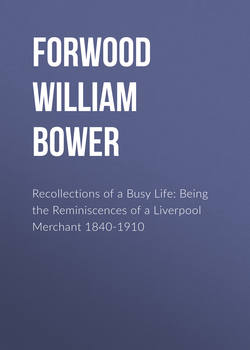Читать книгу Recollections of a Busy Life: Being the Reminiscences of a Liverpool Merchant 1840-1910 - Forwood William Bower - Страница 14
CHAPTER III.
LIVERPOOL
Intellectual Life
ОглавлениеLiverpool has been always too much absorbed in her commerce to take any prominent position in the world of literature and education, until recent years, when we have atoned in some degree for our remissness in the past, by the founding of our University. Professor Ramsay Muir, in a recent speech, however, claims that we had a Renaissance in Liverpool in the early years of the 19th century, when a group of thinkers, scholars, and writers, finding its centre in William Roscoe, gave to Liverpool a position and a name in the literary world, and she became a real seat of literary activity. To that remarkable man, William Roscoe, we owe the Athenæum, the Literary and Philosophical Society, and the Roscoe collection of pictures now in the Walker Art Gallery. This intellectual effort quickly lost its vitality, and for long years the Literary and Philosophical Society, and the Philomathic Society, struggled alone to keep burning the light of higher culture and literary activity.
Elementary education was almost entirely in the hands of the Church; middle class education depended upon the Liverpool Collegiate, the Mechanic's Institute, afterwards the Liverpool Institute, and the Royal Institution.
The fashion of sending boys to our great public schools did not set in until the 'seventies.
Such was the condition of intellectual life when, in 1880, the Liverpool University College was established, mainly through the efforts of the late Earl of Derby, William Rathbone, Christopher Bushell, E. K. Muspratt, David Jardine, Sir Edward Lawrence, Robert Gladstone, Mr. Muspratt, Sir John Brunner, John Rankin, and William Johnston. The first Principal, Dr. Rendall, rendered excellent service in these early struggling years, which were happily followed by still greater and even more successful efforts under Vice-Chancellor Dale, resulting in the granting of a Royal Charter in 1903, and the founding of a University. The Earl of Derby became Chancellor, and Dr. Dale Vice-Chancellor. The University has been nobly and generously supported by Liverpool men; indeed a reference to the calendar fills me with surprise that so much could have been accomplished within such a brief period. Its work is making itself felt in the general uplifting of the level of education, while the presence in Liverpool of such a distinguished body of professors has had considerable influence in giving a higher and more intellectual tone to society, and in opening up new avenues for thought and activity.
We must not omit to record the excellent work done by the School Board. When first established in 1873, the election of members provoked much sectarian animosity, but in the course of time, through the exertions of Mr. Christopher Bushell and Mr. Sam Rathbone, this hindrance to its success was overcome, and the excellence of its organisation was generally recognised. Its functions have, during the past few years, been transferred to the City Council.
One of the results of the School Board was the founding of the Council of Education, which provided, in the shape of scholarships, the means by which boys could advance from the elementary school to the higher grade schools and the universities. Mr. Sam Rathbone, Mr. Gilmour, and Mr. Bushell were very active in promoting this association.
